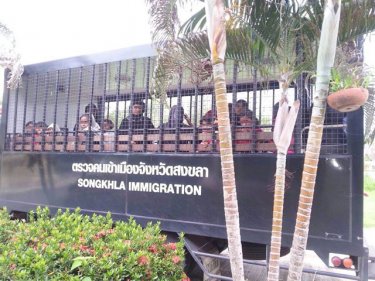The nine escapers were simply making their way along the ''human trafficking superhighway'' that runs through Thailand, according to US Congressman Chris Smith.
Stalled on the superhighway at present are more than 1000 Rohingya being held in Thai government family shelters or Immigration detention centres. Hundreds more are thought to still be in secret jungle camps in southern Thailand.
The nine escapers, who most likely fled into the arms of traffickers, were part of a group of 29 transferred from southern Thailand to the province of Phang Nga, north of Phuket, because of overcrowding.
Escapes have been frequent and traffickers living in the surrounding community at Khao Lak, a popular holiday spot, often bid for customers.
Sources with connections in Bangladesh and northern Burma say the Rohingya boats are leaving Burma with increasing frequency now, despite the onset of the dangerous monsoon season.
But what happens between the departure and the arrival of the boatpeople in southern Thailand remains a mystery.
Explanations are being sought by journalists, and by Thailand's Immigration Division 6 Commander, Police Major General Thatchai Pitaneelaboot.
He has ceased deporting Rohingya back to Burma (Myanmar) because he realises that the majority who are trucked from southern Thailand to Ranong, on the Thai-Burma border, are quickly embraced by traffickers and shipped south again.
Meanwhile, in the secret jungle camps where the Rohingya are hidden until they can raise the money to pay their way across the border to Malaysia, illness and death remain rife.
Phuketwan recently interviewed a young Rohingya who says he fled a jungle camp after burying 13 fellow inmates.
The women and children who arrived at the shelter north of Phuket last week were all thin and in poor condition. They were taken to a local hospital for health checks.
Boats are sometimes delayed waiting for passengers, so those who board in northern Burma can have spent more than three weeks in cramped holds before arriving in Thailand.
The conditions in the jungle camps are even worse, which accounts for increasing numbers of deaths.
Yesterday came reports that the detainees at one Immigration centre in southern Thailand had gone without eating for two days because the meals they were served were not halal.
Lack of a transparent national policy to either halt the human trade through Thailand or to treat the boatpeople humanely leaves the Rohingya open to abuse and Thailand open to criticism.









I have great sympathy for the Rohingya but on hearing that they are willing to die rather than eat non-halal food starts to take the shine off their cause. If they worship a god that is so unforgiving as to let his worshipers die for such a small infraction then they should change religions and might be less persecuted.
Posted by Ermuffs on May 9, 2014 11:58
Editor Comment:
Some people don't blame their god for misfortune, Ermuffs.